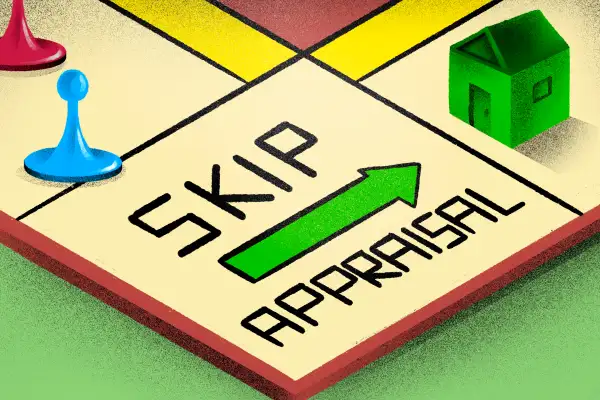In the Competitive Coronavirus Housing Market, This Loophole Is Making It Easier to Buy a House

The pandemic’s latest effect on the housing market could be a good one for borrowers: Fewer mortgages are requiring a home appraisal, which is making it a whole lot easier for some people to purchase a home or qualify for a loan refinance.
According to a September report from the public policy think tank American Enterprise Institute, appraisals were waived on 42% of all government-sponsored purchase and refinance mortgages in July, up from roughly 20% in December.
Rick Bettencourt, a loan officer at Caliber Home Loans in Danvers, Mass., says high demand is fueling the spike. “Appraisers are swamped right now in many markets,” he says. It’s easy to see why, last week refi applications were up 52% from a year ago and purchase applications were up 22%, according to the Mortgage Bankers Association's Weekly Mortgage Applications Survey.
“I had incredible difficulty getting an appraisal done recently in Gilford, New Hampshire, partly because of appraiser availability,” Bettencourt says. “It took us almost a month to complete,” adding that appraisals typically take seven to 10 days to process in normal times.
Here’s what homebuyers and refinancers need to know about getting an appraisal waiver in today’s market.
What is a home appraisal waiver?
In order to minimize their risk, most lenders require an assessment of a home’s value prior to approving a purchase mortgage or refi application. They do this by ordering a home appraisal.
A licensed appraiser, who performers their duties as an independent third party, determines a property’s value by looking at comparable properties (“comps”)—recently sold homes that are similar in style, location, and square footage to the subject property—and, in most cases, checking the condition of the property in person.
Appraisal waivers completely remove this step. Borrowers don’t have to apply for an appraisal waiver — lenders evaluate every loan application and issue waivers automatically to those whose loans qualify. Loan officers don’t decide who qualifies for an appraisal waiver. “That’s up to Fannie Mae and Freddie Mac’s automated underwriting systems, which 99.9% of lenders use,” says Donald Frommeyer, a loan officer at CIBM Mortgage in Indianapolis. Both announced earlier this year that they’re offering more flexible requirements for appraisal waivers due to the coronavirus.
What are the benefits of an appraisal waiver?
Not having to pay for an appraisal saves borrowers money. Appraisals for a single-family home cost, on average, between $312 and $405, according to home services marketplace HomeAdvisor. Saving that money means having more cash in the bank to buy new furniture or make home improvements.
Waivers also speed up the mortgage approval process. With a waiver, buyers and refinancers “don’t have to sit around waiting for an appraisal to come in,” says Frommeyer, thus streamlining the loan approval process. “I’ve heard horror stories where it’s taken people 30 days, or longer, to get an appraisal,” Frommeyer says.
Having an appraisal waiver also enables buyers to waive the appraisal contingency when they make an offer on a house, which can give them a leg up when facing multiple bids. (Proof: 20.6% of winning offers submitted by Redfin agents in June waived the appraisal contingency, up from 17.4% the prior year, according to a report from the real estate brokerage.) Sellers like offers that waive the appraisal contingency, because low appraisals can threaten a deal. According to the National Association of Realtors (NAR), 9% of contract terminations in June were caused by appraisal issues, up from 3% in April.
What are the drawbacks?
If a homeowner has paid off a significant chunk of their mortgage, learning how much equity they’ve gained, through a home appraisal, can be valuable information, says Bettencourt. Without an appraisal, refinancers don’t find out how home equity they’ve built.
Similarly, buyers don’t know if they’re overpaying for a home. An appraisal can show purchasers whether there’s a gap between their contract price and their prospective home’s market value. Borrowers can hire appraisers independently if they still want an appraisal.
Who is eligible?
Appraisal waivers are beneficial for borrowers in most cases, Bettencourt says, but they aren’t offered for all mortgages.
Appraisal waivers are typically not offered for Federal Housing Administration, U.S. Department of Veteran Affairs, or U.S. Department of Agriculture Rural Development loans. Waivers are also not offered for new construction loans.
Conventional, conforming loans (those that are backed by Fannie Mae and Freddie Mac) are eligible for appraisal waivers, with a few caveats. Appraisal-free purchase loans typically require down payments of 20% or more. Appraisal waivers are also rare for mortgage holders applying for a cash-out refinance (before the coronavirus crisis, no cash-refis were eligible for appraisal waivers); and properties that are more difficult to value, such as older homes.
More from Money:
Procrastinators, It's Not Too Late to Refinance Your Mortgage and Save Thousands
Home Equity Is Soaring — if You're Tempted to Borrow Against Your Home, Read This First
